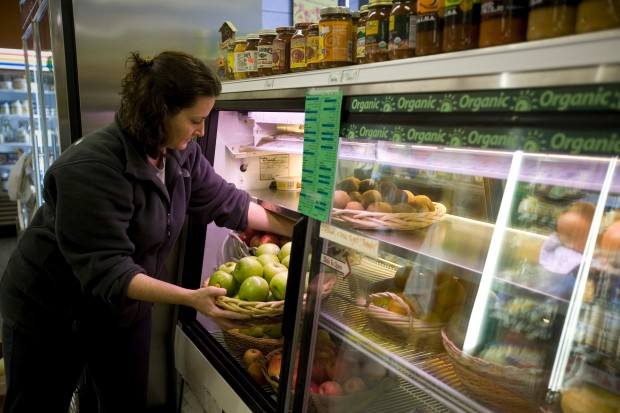
An organic lifestyle could not only save your health, it should save your wealth, too.
That thinking led one Black Hills merchant to stock his shelves with affordable organic items.
“Organic food should be cheaper,” said Vinny Alessi-Narr, who owns and operates Swan’s Organic Market in Hill City with his wife, Karen Swan.
The couple expanded their trading post a few years ago to include organic bulk products, produce, herbs and supplements. The Hill City business also features a small Internet café that sells organic eats.
Alessi-Narr maintains eating organic is possible without breaking the bank. He strives to make it so by pricing his inventory in a way that doesn’t stick it to customers.
Some items are hard to discount.
“But mainly, the basic stuff, we try to discount,” he said. “There’s almost no markup to encourage everybody to eat organic.”
If customers can purchase more for less, Alessi-Narr figures he’ll make up the difference through higher sales volume.
“Everybody will come in and buy more often,” he said. Alessi-Narr, who is originally from Germany, said he believes everyone deserves to eat organic. But he finds the price tag often gives it an unfair rap.
“Organic has a bad reputation of being expensive,” he said. Organic food generally costs more than conventional food because farms that avoid chemicals must employ more labor-intensive practices.
Even if consumers do have to pay a little more to eat organically, Alessi-Narr said, they’ll come out on top in the long run. He argues organic food offers buyers more bang — in the form of higher nutrients — for their buck, which translates to better health and fewer medical expenses over time.
“At the end of the day, you save money to eat organic,” he said. One key to buying organically on a budget is searching out alternatives to the supermarket. Small niche shops such as Swan’s are one option.
Buying in bulk also keeps costs down. Bulk shipments save money, and those savings are passed on to the customer.
Breadroot Natural Foods Co-op in Rapid City offers an extensive organic bulk section.
“Our bulk area takes up over half of the store,” said Jessica Kerlin, a manager at the Main Street business.
Breadroot sells natural foods and household supplies to the general public and members. The store’s $20 annual membership fee includes a 5 percent discount, voting privileges and shares of stock in the co-op.
Members qualify for further discounts by helping out with everything from cleaning to cashiering.
The co-op’s REACH program additionally offers a dozen “super foods” available at cost.
“Our board of directors many years ago chose a few essential items — staples in your home that are nutritious and usually available every week,” Kerlin said.
These vital goods include raw almonds, apples, dried plums, flax seeds, grapefruit, kale, dried navy beans, Romaine lettuce and short-grain brown rice.
Bulk purchases may not be as attractive to shoppers with limited storage. If your pantry shelves can’t hold a year’s supply of dried fruit, consider sharing an order with friends. People who order through Breadroot can offer to split cases of goods with other members.
Save more money by buying in season. Seasonable fruits and vegetables are more affordable.
Breadroot and Swan’s try to support local farmers.
“We get the community bringing in local produce,” Kerlin said.
They also offer these tips:
Go online if you don’t know what’s in season. A quick Internet search should help you determine what to buy when. Make in-season purchases go even further by looking for recipes that incorporate seasonable items.
Cooking, rather than reaching for costlier convenience foods, pinches pennies. Processed organic products are easily available, but buying them is a pricey approach to going organic.
Consider making meals from scratch. Fill your grocery cart with staples and minimally processed foods. With a little prep, some planning and the right recipes, you can whip up healthy meals that don’t bust the budget.
“People say they have no time to cook,” Alessi-Narr said. “Sometimes you have to show them that stuff doesn’t take more time.”
If you’ve got the time, consider growing your own organic produce. Don’t have space for a garden? Try using containers. A packet of organic seeds costs more than regular seeds, but harvesting your own is cheaper than splurging on the fruits of someone else’s labor.
Ask for help if you don’t know where to start. Alessi-Narr said he’s helped more than one customer make over his or her refrigerator and pantry.
“We can replace pretty much everything,” he said. “We sell everything organic, from the toilet paper to the cleaning supplies.”
The transition requires some commitment, but cost shouldn’t keep people from adopting an organic diet.
“Our main goal is for everybody to eat healthy,” he said. “It should not be only for the rich.”
Article Courtesy of: http://www.rapidcityjournal.com

